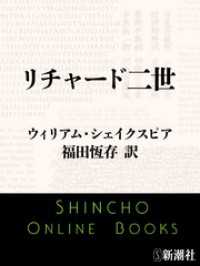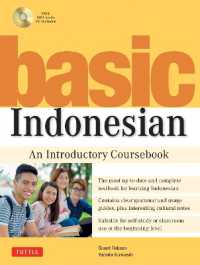- ホーム
- > 洋書
- > 英文書
- > Psychology
Full Description
Although much of the hubris and hyperbole surrounding the 1990's Internet has softened to a reasonable level, the inexorable momentum of information growth continues unabated. This wealth of information provides resources for adapting to the problems posed by our increasingly complex world, but the simple availability of more information does not guarantee its successful transformation into valuable knowledge that shapes, guides, and improves our activity. When faced with something like the analysis of sense-making behavior on the web, traditional research models tell us a lot about learning and performance with browser operations, but very little about how people will actively navigate and search through information structures, what information they will choose to consume, and what conceptual models they will induce about the landscape of cyberspace.
Thus, it is fortunate that a new field of research, Adaptive Information Interaction (AII), is becoming possible. AII centers on the problems of understanding and improving human-information interaction. It is about how people will best shape themselves to their information environments, and how information environments can best be shaped to people. Its roots lie in human-computer interaction (HCI), information retrieval, and the behavioral and social sciences.
This book is about Information Foraging Theory (IFT), a new theory in Adaptive Information Interaction that is one example of a recent flourish of theories in adaptationist psychology that draw upon evolutionary-ecological theory in biology. IFT assumes that people (indeed, all organisms) are ecologically rational, and that human information-seeking mechanisms and strategies adapt the structure of the information environments in which they operate. Its main aim is to create technology that is better shaped to users. Information Foraging Theory will be of interest to student and professional researchers in HCI and cognitive psychology.
Contents
1. Information Foraging Theory: Framework and Method ; 2. Elementary Foraging Models ; 3. The Ecology of Information Foraging on the World Wide Web ; 4. Rational Analyses of Information Scent and Web Foraging ; 5. A Cognitive Model of Information Foraging on the Web ; 6. A Rational Analysis and Computational Cognitive Model of the Scatter/Gather Document Cluster Browser ; 7. Stochastic Models of Information Foraging by Information Scent ; 8. Social Information Foraging ; 9. Design Heuristics, Engineering Models, and Applications ; 10. Future Directions: Upward, Downward, Inward, and Outward








